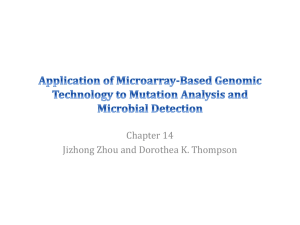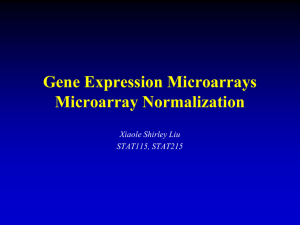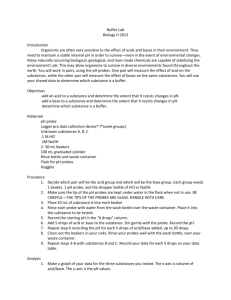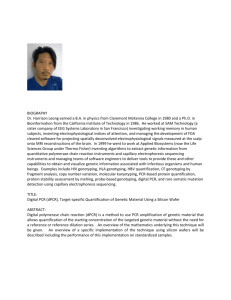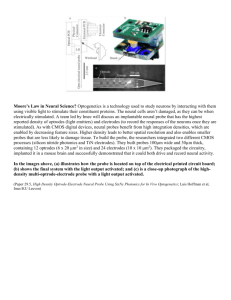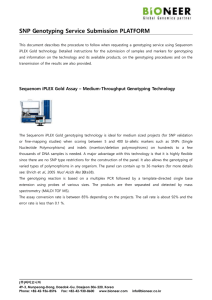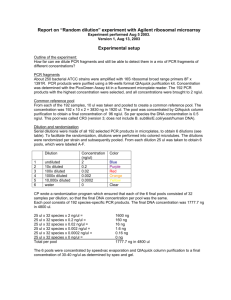Appendix 2
advertisement
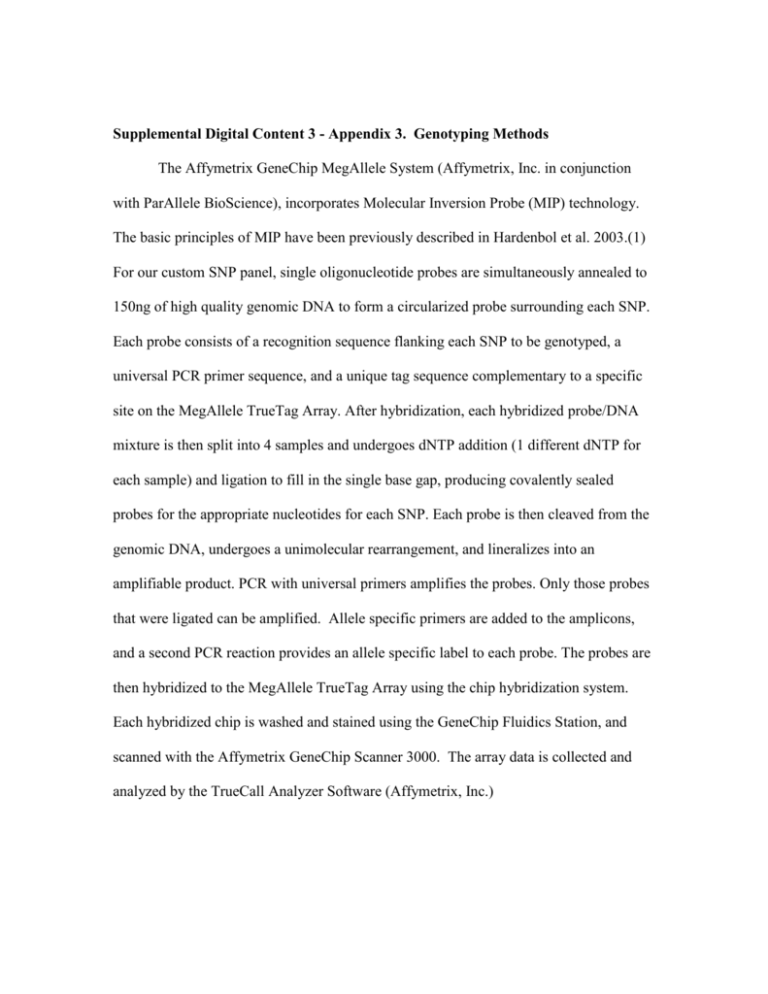
Supplemental Digital Content 3 - Appendix 3. Genotyping Methods The Affymetrix GeneChip MegAllele System (Affymetrix, Inc. in conjunction with ParAllele BioScience), incorporates Molecular Inversion Probe (MIP) technology. The basic principles of MIP have been previously described in Hardenbol et al. 2003.(1) For our custom SNP panel, single oligonucleotide probes are simultaneously annealed to 150ng of high quality genomic DNA to form a circularized probe surrounding each SNP. Each probe consists of a recognition sequence flanking each SNP to be genotyped, a universal PCR primer sequence, and a unique tag sequence complementary to a specific site on the MegAllele TrueTag Array. After hybridization, each hybridized probe/DNA mixture is then split into 4 samples and undergoes dNTP addition (1 different dNTP for each sample) and ligation to fill in the single base gap, producing covalently sealed probes for the appropriate nucleotides for each SNP. Each probe is then cleaved from the genomic DNA, undergoes a unimolecular rearrangement, and lineralizes into an amplifiable product. PCR with universal primers amplifies the probes. Only those probes that were ligated can be amplified. Allele specific primers are added to the amplicons, and a second PCR reaction provides an allele specific label to each probe. The probes are then hybridized to the MegAllele TrueTag Array using the chip hybridization system. Each hybridized chip is washed and stained using the GeneChip Fluidics Station, and scanned with the Affymetrix GeneChip Scanner 3000. The array data is collected and analyzed by the TrueCall Analyzer Software (Affymetrix, Inc.) Genotyping using the sequenom perform was done using the iPLEX Gold method. iPLEX reagents and protocols were used for multiplex PCR single base primer extension (SBE) reactions. Multiplexed assays typically contain between 10-36 SNPs. Reactions were desalted and SBE products measured using the MassARRAY system, and mass spectra analyzed using TYPER software (Sequenom, San Diego), in order to generate genotype calls and allele frequencies (for complete details see iPLEX Application Note, Sequenom, San Diego). The SNPlexTM Genotyping System uses the Applied Biosystems oligonucleotide ligation assay (OLA) combined with multiplex PCR technology to achieve allelic discrimination and target amplification. The basic principles of SNPlex chemistry are made possible through the use of a set of universal PCR primer sequences, a set of SNPspecific ligation probes and multi-color ZipChuteTM Probes that target unique allele sequences of single nucleotide polymorphisms (SNPs) in genomic DNA (gDNA) samples as described in Tobler et al, 2005.(2) During the OLA procedure, allele-specific probes and linkers as well as universal linkers ligate to and phosphorylate 80ng of high quality gDNA. The probes contain a unique ZipCode TM sequence for the ZipChuteTM probe that binds to hybridized PCR product described later in this section. After the OLA reaction, exonucleases purify the OLA product by digesting portions of the ligated product, unligated, partially ligated oligonucleotides and gDNA. The purified product is amplified with universal forward and reverse primers resulting in a double-stranded amplicon with one biotinylated strand. The PCR product and positive hybridization control is bound to a streptavidin-coated hybridization plate. The double stranded amplicon is separated with the biotinylated strand remaining bound to the plate. Fluorescently labeled ZipChuteTM probes hybridize to the ZipCode TM sequence. To establish a sizing calibration curves, a fluorescently labeled size standard is added. The sample with the ZipChuteTM probes are eluted from the hybridization plate and transferred into a 96-well reaction plate, Allelic Ladder is dispensed into the reaction plate and the plate is loaded into the Applied Biosystems 3130xl DNA Analyzer. The Applied Biosystem 3130xl enables the separation and detection of SNP genotypes using standard capillary arrays. The array data is collected and analyzed by GeneMapper Software (Applied Biosystems). 1. Hardenbol, P, Baner, J, Jain, M, et al. Multiplexed genotyping with sequence-tagged molecular inversion probes. Nat Biotechnol 2003; 21:673. 2. Tobler, A R, Short, S, Andersen, M R, et al. The SNPlex genotyping system: a flexible and scalable platform for SNP genotyping. J Biomol Tech 2005; 16:398.


